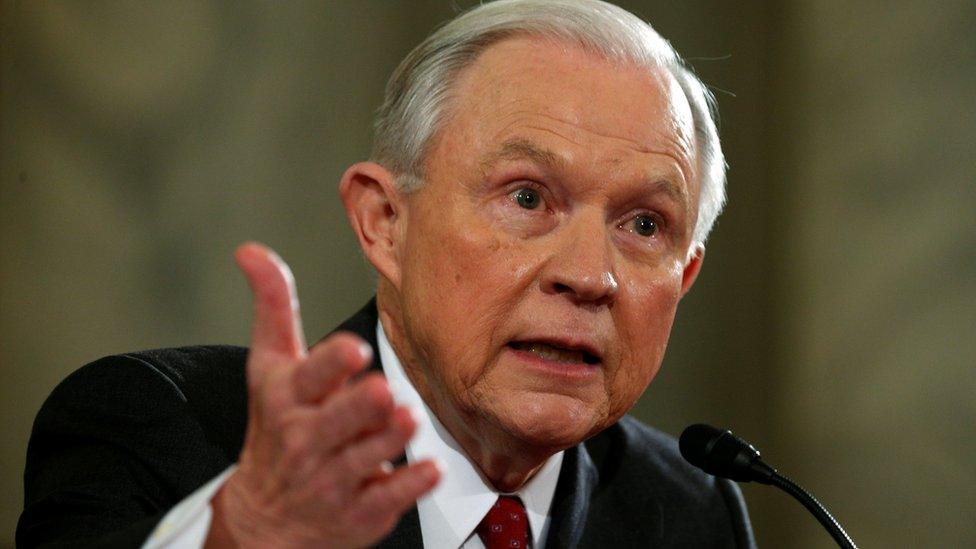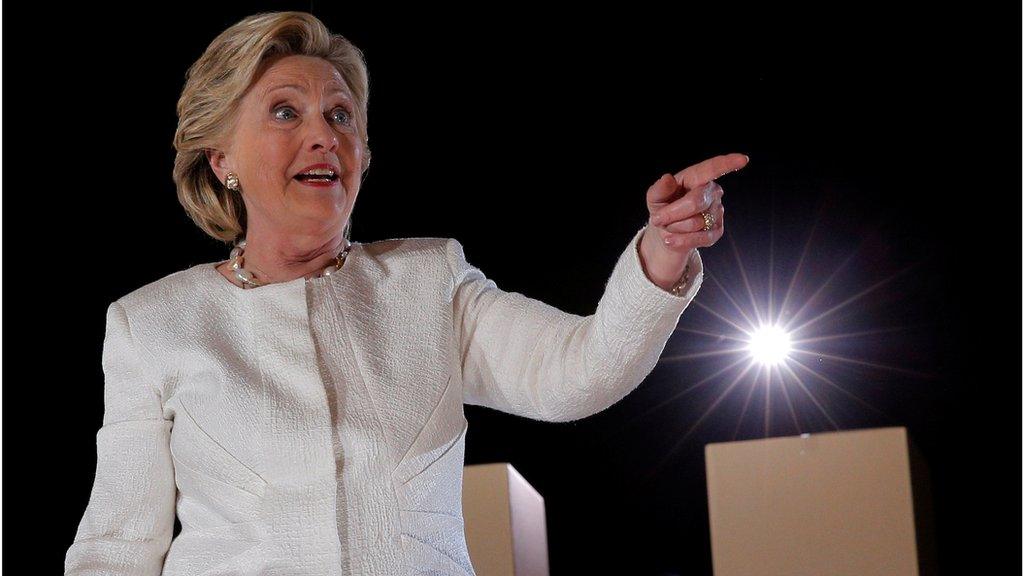Jeff Sessions: What he revealed about Trump's priorities
- Published

During Jeff Session's first day of confirmation hearings, Democrats did not provoke any blockbuster revelations that would bring his attorney general hopes crashing down in flames.
Senators on both sides of the aisle, however, were able to draw Mr Trump's nominee out on a wide range of issues, revealing how he would go about running the Justice Department and what his priorities would be.
Here's a look at some of the more significant topics of discussion.
Clinton investigations
Last year Senator Jeff Sessions said that the FBI should have been more aggressive in investigating Democrat Hillary Clinton's use of a private email system and possible corruption in the her family's charitable foundation.
On Tuesday morning he said that because such previous comments could call into question his impartiality, he would recuse himself from any future Justice Department investigations into the former Democratic presidential nominee.
He also downplayed concerns, aired during the presidential campaign, that Mr Trump might be prone to use the powers of the presidency to punish political foes.


More on Sessions' confirmation

Abortion
When California Senator Diane Feinstein asked Mr Sessions about his past opposition to the 1973 Roe v. Wade Supreme Court decision legalising abortion across the US, the nominee stood by his view that the case was a colossal mistake.
He noted, however, that the decision was the "law of the land" and that he will "respect and follow it" - a line he also used regarding the recent court decision to legalise same-sex marriage.
Mr Sessions later said that he would enforce laws guaranteeing access to abortion clinics and prohibiting protesters from disrupting their operation.
Abortion opponents have been focused less on overturning the Roe decision in recent years, however, instead opting for limiting when and where women can obtain abortions. On that topic, Mr Sessions was much more opaque.

Muslim ban
Mr Sessions, when asked about Mr Trump's past support for temporarily closing the US border to all Muslims, said neither he nor the president-elect currently backed such a policy.
Instead, he said, the incoming administration's plan was to subject individuals from countries with ties to terrorism to "strong vetting". He did concede, however, that a new arrival's religion could be taken into consideration by US immigration officials
"Sometimes, at least not in a majority, many people do have religious views that are inimical to the public safety of the United States," he said.

Jeff Sessions said caricature of him as a 'Southern racist was painful'
Voting rights
Mr Sessions has been an advocate for voter ID laws in the past - measures that have, at times, run afoul of the federal Voting Rights Act.
When asked about a recent decision by a Texas court to strike down their strict law, the Alabama senator professed a lack of knowledge of details.
"I have publicly said I think voter ID laws properly drafted are ok," Mr Sessions said. "But as attorney general it will be my duty to study the facts and in more depth, to analyse the law, but fundamentally that can be decided by Congress, and the courts, as they interpret the existing law."
He was more forthcoming when asked about the portion of the Voting Rights Act ruled unconstitutional in 2013 by the US Supreme Court that required a number of states, mostly in the South, to receive federal clearance before taking actions affecting voting rights. He called it "intrusive".

Waterboarding and Guantanamo
The practice of waterboarding detainees, according to Mr Sessions on Tuesday, is "absolutely improper and illegal".
That represents a bit of a departure for the Alabama senator, who voted against the 2015 law making it illegal, and runs contrary to Mr Trump's campaign position that he backed measures "a hell of a lot worse than waterboarding".
As for the US detention facility in Guantanamo Bay, Cuba, the attorney general nominee was on the same page as the president-elect.
"It's a safe place to keep prisoners," he said. "I believe it should be utilised in that fashion and have opposed the closing of it."

A Democratic critic says there's no evidence Sessions will be 'fair and humane' on immigration
Enforcement priorities
Over the course of the more than six hours of testimony on Tuesday, Mr Sessions was asked about how vigorously he'd pursue a variety of Justice Department priorities. He wouldn't rule out increased enforcement of federal drug laws in states that have decriminalised marijuana and suggested he might restart a task-force charged with prosecuting violations of anti-obscenity laws.
Mr Sessions also made clear that he did not support the "prosecutorial discretion" that the Obama administration used to suspend the deportation of some groups of undocumented migrants, such as those who entered the US as children.
While he didn't directly call for reversing Barack Obama's executive orders on immigration, he said it was of "very questionable" constitutionality and that his Justice Department wouldn't object to reversing it.